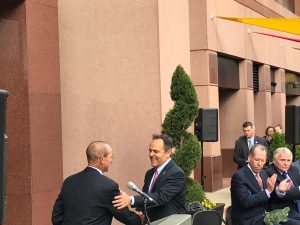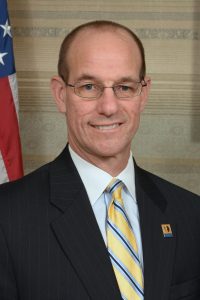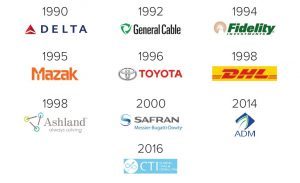By Mark Hansel
NKyTribune managing editor
The announcement last month that Dan Tobergte would step down Northern Kentucky Tri-County Economic Development Corporation (Tri-ED) came as something of a surprise.
Tobergte had held a prominent position at Northern Kentucky’s economic development engine for nearly three decades prior to officially stepping down August 2.
Northern Kentucky secured a commitment from Amazon Prime to locate a $1.49 billion hub in Boone County in January, 2017, the largest in the region in at least 30 years.
Despite that project, and a string of other successes during his tenure, Tobergte said it was time for a change.
“I think it was a time for me to be able to say after almost 14 years in this role and almost 28 years total, it’s time for a fresh look,” Tobergte said. “The organization is in very good shape financially, the economy is in good shape and I’d much rather go out on a high, than go out on a low. So it’s a good time for me to be able to explore other opportunities and that’s what I’m doing right now and I’ve got the support of the Board. “
The Tri-Ed Board of Directors has engaged a consultant to come in and take a look at the corporation, in a process that is currently underway.
Tobergte sat down with the Northern Kentucky Tribune to talk about the path that has taken him, and Tri-ED, to positions of respect in the world of economic development.
Tobergte, a Northern Kentucky native, attended Eastern Kentucky University, obtaining a Masters of Public Administration degree in less than five years.
He returned to Northern Kentucky and worked as a volunteer on an annexation attempt in Florence and a special project in Boone County to gain experience.
His first full time job was in Forest Park, Ohio, working for the city manager and economic development director.
“That’s where I got my taste for economic development,” Tobegte said. “It tasted pretty good because after a year-and-a-half there, I found an opportunity and was able to come on board with the City of Covington in the Economic Development Department.”
Tobergte worked there from 1986 to 1990, but in 1987, he learned about the new venture known as the Northern Kentucky Tri-County Economic Development Corporation.
“I worked with Jim West in a couple of different manners from Covington’s standpoint,” Tobergte said. “One day he tapped me on the shoulder and said if I was looking for a position, things were going really well at Tri-ED, activity is picking up and he could use some help.”
Tobergte came on board in June of 1990 and worked on manufacturing prospects, while West focused on office projects.
“We had some great experiences and the first one we teamed up on was the Fidelity project in 1992,” Tobergte said. “Jim was the primary on that and I assisted. That project really put Tri-ED on the map from the standpoint that we could make a difference in this community. Never were we the only reason that a company makes a decision to locate or expand here, but we were part of it and we think we made a positive difference in the project.”
Kevin Canafax, Midwest Vice President for Public Affairs at Fidelity, said the project was a milestone not only for Tri-ED, but the Commonwealth of Kentucky.
“Conversations originally began in 1991 about opening a regional center operation for Fidelity in Kentucky, actually Greater Cincinnati was the target,” Canafax said. “We had already leased space for a retail brokerage operation up in Blue Ash, so we were in this market, we were very familiar with it, the labor market in particular. We were looking for a parcel of land to build out a campus, the first of its kind within Fidelity.”
Tobergte, Canafax said, played a significant role in helping to craft the agreement.
“He was the conduit between not only all of the local government agencies, in Northern Kentucky and Greater Cincinnati, but also the main point of contact as it related to the Cabinet for Economic Development,” Canafax said. “Ever since I’ve been in Fidelity, I joined the firm in 1994, Dan has been my go-to person, my point of contact on all matters related to the Fidelity project.”
Over the years, as Fidelity expanded Tri-ED continued to work with the company and gain valuable experience along the way.
“Certainly, the project itself was already announced and launched by the time I joined Fidelity, but subsequently, over time, any expansion that we incurred on the campus…Dan was instrumental and very prominent in all of those discussions,” Canafax said. “The other thing I would say about Dan is, he was also very prominent and active in representing Tri-ED in many other facets in the community, including the public sector, the elected officials and the Northern Kentucky Chamber.”
In 1998, West decided to move to Augusta, Georgia, which created an opening for the position that was then identified as executive director, and Tobergte applied.
“I was not afforded the opportunity at the time, but was given a good consideration to continue to work within the organization, which I did,” Tobergte said. “I worked with Danny Fore, who came in from Fayetteville, North Carolina, and he brought some different skill sets and ideas to the organization.”
Tobergte led Tri-ED on an interim basis as the search was being conducted and began working on a real estate project to attract the company that would become Safran Landing Systems.
At the time, the company was known as A-Carb and its business was the compression of carbon fibers into disk brakes for the aviation industry.
“We are the ones that are looked upon to provide the solid, factual, accurate information. You have to know your own community, you have to know what you’re marketing and then you have to be able to deliver on what you have said this community can provide and that’s part of our role, too,” Dan Tobergte, who recently stepped down after 14 years as CEO of Northern Kentucky Tri-ED
“That was a significant project for us to assemble the land and put the incentive package together to be able to provide that 40 acres of opportunity,” Tobergte said. “That stands out as the time frame that we had the busiest year ever in Tri-ED’s history, in terms of number or projects. We had 55 deals that we announced that year and we typically announce 24, so it was more than a 2x year. On top of that we had north of a $1 million land acquisition.”
Safran Landing Systems has contributed more than $250 million in capital investment in Northern Kentucky and has well over 400 employees in its three facilities here.
At the time, coming off a year of unprecedented success and being denied the top job, Tobergte admits there were other opportunities on the table that he strongly considered.
“There were a couple of good ones that I was close to taking, but I turned them down,” Tobergte said.
Tobergte’s loyalty was rewarded six years later when Fore left, and the Board decided there was no need for a national search.
“I was afforded the opportunity at that time to make a presentation and put my plan forth to lead the organization,” Tobergte said. “I was granted the opportunity and I am forever grateful for that, but I had to prove that I was going to be able to do some things that were important and different.”
One of those ideas was to fully consider the opportunities in the entrepreneurship support sector, which led to the merger of the Madison E-Zone into Tri-ED’s operation in 2007.
“With the support of the Board, we brought E-Zone on board and were able to keep it in the urban core and let it grow there, where it was best to flourish,” Tobergte said. “We’ve seen significant improvement in entrepreneurial support of this community through that effort, so that’s one of the things we are really proud of.”

Thomas Prewitt, a partner at Graydon Head, credits Tobergte for having the vision to recognize the role entrepreneurs would play in Northern Kentucky’s economic prosperity.
Tom Prewitt, a partner at Graydon Head, and founder of the E-Zone praised Tobergte for his vision in recognizing the critical role entrepreneurs would play in economic development in this region and nationwide.
“For Northern Kentucky, that marked a critical point in the history of the entrepreneurship ecosystem building,” Prewitt said. “I give Dan a lot of credit for seeing the wisdom in doing that.”
By that time Tobergte’s title had changed to president and CEO, but he continued to work projects.
“The executive committee did not want me to sit back and direct others to work projects, they wanted me involved,” Tobergte said. “We were too short and shallow an organization to delegate all of that out. You just don’t want to be tapped on the shoulder and say we need you now, so I would continue to work projects during the time that I was CEO and that carried for almost 14 years.”
Tri-ED has come to be viewed as the front door and the facilitator for primary industry location, expansion and startup decisions for the region.
“We are the ones that are looked upon to provide the solid, factual, accurate information and then also there’s a lot of qualitative information that we need to provide. You have to know your own community, you have to know what you’re marketing and then you have to be able to deliver on what you have said this community can provide and that’s part of our role, too.”
Tri-ED has achieved a success rate of about 24 percent on projects it pursues, in an industry where 10 percent is considered respectable. Despite that rate, there are times when it is not successful, or when companies decide to move to another market.
“We play a very important role, but we’re not going to be able to keep every company that is here, we’re going to lose some, just by the nature of business cycles,” Tobergte said. “So, you have to have an organization that’s ready to replenish, ready to add new and ready to be a leader of the community.”
While Tobergte is realistic about companies that leave, or choose to locate elsewhere, it still pains him when Northern Kentucky loses out on a project.

Kentucky Governor Matt Bevin, right, congratulates Tobergte for Tri-ED’s role in bringing CTI to Covington at the company’s ribbon-cutting last year (file photo).
He sees German-based Festo, an automation technology company, as the one that got away.
“There are always a number of factors that go into a site location and we don’t always know what the real reason is that a company makes a decision, but we get a good sense for what drives a decision,” Tobergte said.
Greater Cincinnati was successful as a region in attracting the Festo project to Mason and Tobergte says Tri-ED had a role in that.
“We worked for four years to drive that project to Northern Kentucky and we finished second in the site selection race for that project, which came out of Long Island, New York,” Tobergte said. “We are always appreciative that we were helpful to get them to consider the region, but the quality-of life-factor came into play when they made the decision which community to select. That’s a learning moment for this community, if you will, that we all ought to embrace.”
The way that communities around this region compete with each other, Tobergte said, helps sharpen all pencils.
“It’s our responsibility to put Northern Kentucky in the best light possible and get those deals,” Tobergte said.
Tri-ED and Northern Kentucky did just that, when it attracted CTI Clinical Trial Services to Northern Kentucky in 2016. The company announced plans to vacate its, Blue Ash, Ohio, headquarters and was considering a move outside of the region.
Instead, because of a collaborative effort in which Tri-ED played a critical role, CTI decided to invest more than $36 million and move to RiverCenter Towers in Covington.
“The CTI project is one that was an intra-regional move, but they were destined to make the move to an urban area – that was determined by their CEO,” Tobergte said. “We came from last place to first place and that really gave our team some satisfaction that we really did step in there and make a difference on that project.”
DHL is another company that was considering a move and trying to decide between Northern Kentucky and two Midwestern cities for its hub location.
“We were able to work jointly with the airport and put together a package that helped keep DHL here,” Tobergte said. “Then they left, but then they came back.”
DHL now operates one of its three global superhubs at Cincinnati/Northern Kentucky International Airport and has invested more than $280 million in its operations there since 2009.
Tobergte says he is perhaps proudest of the way Tri-ED is respected outside of Northern Kentucky.
“The way that we are viewed and accepted within the region now, by predominantly Cincinnati interests, is well above what it was in the late 80s and early 90s,” Tobergte said. “We also collaborate even better with Cincinnati. It was a good collaboration that has just gotten better and better, particularly with REDI Cincinnati, where we jointly market the region very effectively.”
Tri-ED and REDI Cincinnati joined forces on the proposal for the Amazon HQ2 project, which was unsuccessful, but Tobergte says would not have happened without a good solid relationship between the two entities.
“We would not have been able to get the states together,” Tobergte said. “A lot of times, the process is better than maybe what you anticipate, and it was, it was a good process for us to go through.”
Canafax said cooperation among the agencies on both sides of the river is critical and Tobergte has played a key role in the development of the partnership with REDI Cincinnati to present a coordinated effort around regional economic development.
“Each state has responsibility for economic development within their boundaries, but the fact that they are all talking to each other and marketing the region collectively, is very good competitively, for us on a global stage,” Canafax said.
Tobergte has committed to assist with the Transition at Tri-ED, both with the interim leader and the new CEO.
“I’m very encouraged by going public with this and getting the word out and I’m very encouraged with the opportunities that are out there,” Tobergte said. “I’ve got the opportunity to discern and decide and that’s what I’m going to do and I’d like to stay in the community. I’ve had a hand in improving the business community around here, so I might want to take a little advantage of that.”
Karen Finan, president and CEO of the Northern Kentucky Regional Alliance, was recently named interim director and Tri-ED will conduct a national search for a permanent successor.
Finan is one of a host of former Tri-ED staff members that Tobergte said he has been privileged to work alongside.
“I’m also forever thankful and appreciative of the mentors that have preceded me, led by Bill Robinson, Jim West, Danny Fore and the multiple board members,” Tobergte said. “I’ve learned from each and every one of them how to do this work and represent this community better.
Robinson, who died in May of last year is recognized as the visionary behind the creation of Tri-ED. At the celebration of Tri-ED’s 30 year anniversary in 2017, he was posthumously awarded the inaugural Bill Robinson Economic Development Award.
“I would also like to recognize all the community players, the cities, the counties and just the sheer number of people that go into this fabric of Northern Kentucky,” Tobergte said. “It’s been extremely gratifying and satisfying to be able to work within and for the community I love.”
Contact Mark Hansel at mark.hansel@nkytrib.com






















